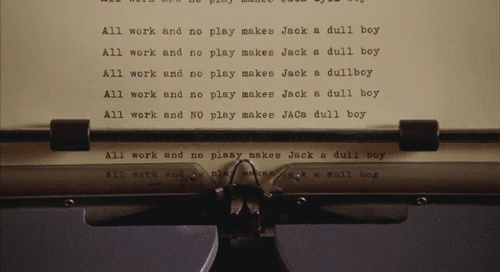Writer’s block is every storyteller’s worst nightmare.
(Yes, it’s even worse than failure. Because if you fail, you can always try again. But when you’re blocked, you can’t even try now.)
No matter how prolific you are, or how effortlessly you’ve been able to write up to this very moment, writer’s block always feels as if it’s just a sentence away. And like any uninvited guest, once writer’s block arrives on your page, there’s no telling how long it’ll stay.
The good news is, there is a way to overcome writer’s block. (In fact, there are several.)
But there’s a catch:
Before you can bash through writer’s block, you have to stop telling yourself the lie that’s causing it.
Where Does Writer’s Block Come From?
Writer’s block is the result of ego (our own) plus fear (of everyone else).
The lie we tell ourselves is this:
After we’ve been writing for awhile, we start believing that everything we’ve written until now has been good (or at least “good enough”).
This creates an imaginary floor in our work, a line of perceived quality that we won’t let ourselves go below. Anything that doesn’t seem at least as good as what we’ve written up to this moment will stop us in our tracks, trapping us in the basement, desperate to find a way back to the light of “good enough.”
As such, we can’t possibly allow ourselves to write something that doesn’t meet our own expectations, because we fear we’d be exposed as untalented, mediocre hacks. (See: imposter syndrome.)
Ironically, the longer we sit around waiting for a “good enough” idea to magically appear, the scarier this dry spell seems.
Have we lost our touch?
Were we ever any good to begin with?
Meanwhile, we keep seeing work by others that’s nowhere near as good as what we think we’re capable of, and we wonder why they’re getting published and read but we’re not. (Hint: It’s because we’re not done.)
And here’s where things get really weird:
In trying to “fix” this problem, we often make it worse by convincing ourselves of a second lie: we tell ourselves we’re blocked for a reason, so we have to wait around for the right answer.
When we do this, we reject most of the solutions that come to mind because they seem too easy.
And the longer we do this, the higher our imaginary bar for the “right” answer rises.
Thus, the best solution for writer’s block is to break through it as fast as possible.
To do this, we need to recalibrate our own expectations of what we’re really trying to accomplish.
Start by moving the goal line.
You don’t need to write the best version of your current story, article, or report. You don’t even need to write something that’s “good enough.” You just need to finish the imperfect first draft.
(And if you’re still stuck during a subsequent draft, just write the next one… and the next.)
Then, break your problem into its smaller pieces.
Maybe you already have part of a draft finished… but one or two scenes still have you stuck.
Or a few loose ends.
Or just one f***ing line of dialogue.
In that case, you don’t need to solve the entire problem now. You just need to write the simplest placeholder that allows you to keep moving toward a completed draft.
Here are five suggestions for doing exactly that.

No, everything’s fine, why?
How to Solve the Five Most Common Types of Writer’s Block
PROBLEM: You’re stuck on a detail.
SOLUTION: Don’t write the whole scene or section; just write a summary of what that scene or section needs to accomplish.
If you’ve wasted three days trying to figure out the exact machinations of the villain’s booby trap… skip it. Just write “Taylor and Kanye find the gold, but Taylor accidentally sets off the trap and has to decide whether to save the gold or Kanye.”
Boom. Done. Next scene?
PROBLEM: You’re stuck on dialogue.
SOLUTION: Don’t write the exact dialogue; just write what the dialogue needs to convey.
We all know that dialogue is really subtext, but finding the perfect in-character way to say something with humor and economy can take several drafts. Don’t get stuck on finding the exact right phrase on the first draft. Just write what the characters really mean; you can always obscure it later.
RICK: What are you doing here?
ILSA: It’s complicated.
RICK: I want you to leave, but I refuse to let you know how much you hurt me.
ILSA: I can’t leave, and I also need your help.
RICK: No.
Boom. Done. Next scene?
PROBLEM: Your argument won’t come together.
SOLUTION: Write the opposite of what you’re trying to say.
If you’re trying to make a point, but you can’t get all your scattered thoughts to add up, try making the exact opposite argument instead. If you believe every Marvel movie is a singular masterpiece, what would someone who believes the opposite say in order to convince you?
Once you can successfully make the argument that you disagree with, you’ll know what points you have to rebut in your own writing.
PROBLEM: You’re stuck at the beginning.
SOLUTION: Write backwards.
Beginnings are tough. They’re much easier to write after you know how your story ends. If you’re stuck, write your last scene, your summary, or your closing argument first. Once you have that landmark, you’ll have a clear focus, and anything that doesn’t help you get there faster or with greater impact will be easier to cut.
PROBLEM: You don’t even have an idea to start with.
SOLUTION: Write something purposely terrible.
Here’s a secret: writing something terrible on purpose is incredibly difficult.
(There’s even a contest dedicated to it.)
If you’re struggling to even come up with an idea for your next story, article, or report, try to write something downright horrendous instead. Take the first, worst idea that comes to mind, and run with it.
Why?
Because one of two things will happen:
Either you’ll have lowered your floor of acceptability so low that it will spark a now-seemingly decent idea by association… or you’ll actually start liking this bad idea, and trying to figure out what you can do to make it better.
Whatever happens, you’ll have broken the curse of the blank page… for one more sentence, at least.
Did You Enjoy This Post?
Then you may also enjoy learning how to easily improve your writing, or how to hook your audience at the beginning of your story.
IMAGE: Tapping a Pencil by Rennett Stowe, via Flickr



0 Comments